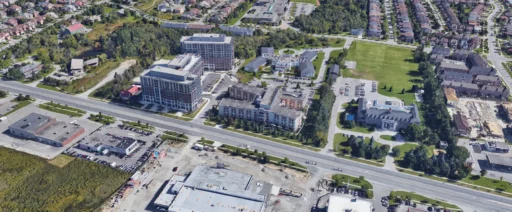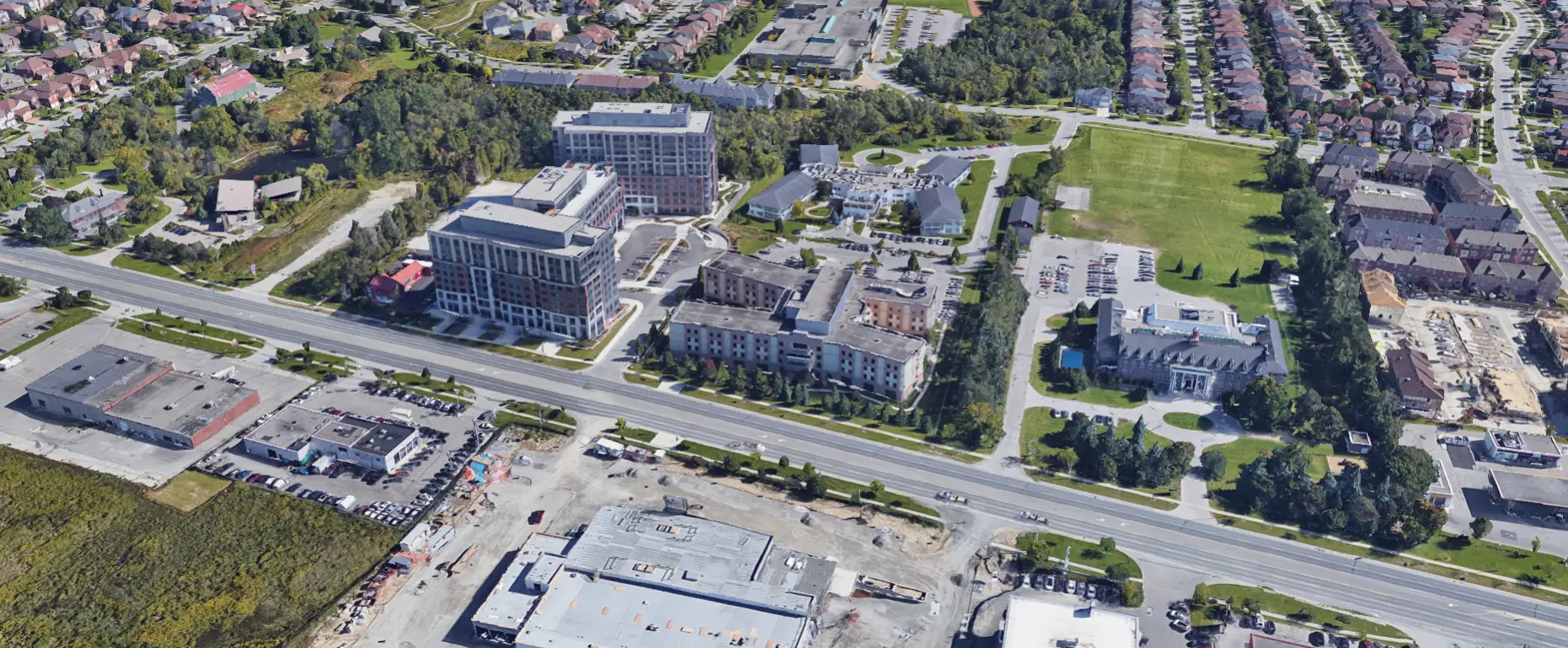Mon Sheong Richmond Hill Long Term Care Centre (11199 Yonge Street, Richmond Hill) is operated by Mon Sheong Foundation (孟嘗會), a Canadian charity to support the Chinese-Canadian community. There are approximately 190 beds.
Google Reviews
The elevator on service wasn't reserved though they made us move on a weekday for the elevator!! We had to take vacation from work for nothing!
They demanded us to move the truck in the middle of our move, they made members of our family leave to check-in with security (who was really rude...he treated us like we were here to rob the place). We had a terrible experience. I highly do not recommend.
Inspection Reports for Mon Sheong Richmond Hill
Our research team carefully reviewed and summarized inspection reports for Mon Sheong Richmond Hill You can read the original copies of the reports in the Government of Ontario website.
June 2023
The inspection, led by Najat Mahmoud and supported by additional inspectors Elaina Tso and Lucia Kwok, took place over multiple days in late May and early June 2023.
The inspection was carried out both onsite and offsite, focusing on a range of intakes including injuries of unknown causes and responsive behaviours.
- Skin and Wound Care: The facility failed to conduct a necessary skin and wound assessment for a resident upon their return from the hospital, as well as a weekly reassessment of the resident’s altered skin integrity. This oversight could result in delayed treatment for potential skin issues.
- Pain Management: There was a failure to assess and monitor the effectiveness of interventions for a resident’s pain using a clinically appropriate assessment instrument. This lack of assessment posed a risk of inadequate pain management for the resident.
- Infection Prevention and Control: The facility did not comply with the Director’s issued standards or protocols regarding infection prevention and control. Specifically, essential personal protective equipment (PPE) was not readily available at the point of care, posing a risk of infectious transmission to both residents and staff.
November 2022
In a detailed inspection report under the Fixing Long-Term Care Act, 2021, by the Ministry of Long-Term Care at Mon Sheong Richmond Hill Long Term Care Centre, the facility was evaluated for compliance with key care standards. This follow-up, complaint, and critical incident system inspection, led by Nicole Lemieux (721709) and assisted by Ana Best (741722) and Asal Fouladgar (751), took place over several days at the end of October and beginning of November 2022.
The inspection aimed to address various intakes including staff to resident neglect, a plan of care, and infection prevention and control. Previously issued compliance orders were also reviewed for adherence.
- Non-Compliance in Infection Prevention and Control: The facility did not follow the required infection prevention and control standard concerning additional precautions. Wrong signage was observed, and although corrected, it indicated a lapse in protocol adherence.
- Reporting Neglect to the Director: There was a delay in reporting suspected neglect of a resident to the Director, which could have exposed the resident to further neglect.
- Plan of Care: The care plan lacked clear directions for staff regarding personal care products, leading to potential risks for the resident. Additionally, there was a failure in collaboration among staff and with the Power of Attorney (POA) in implementing the plan of care, impacting the resident’s routine.
July 2022
The inspection at Mon Sheong Richmond Hill Long-Term Care Centre, conducted under the Fixing Long-Term Care Act, 2021 by the Ministry of Long-Term Care, was comprehensive, focusing on critical areas of resident care and facility management. The inspection, led by Lucia Kwok (752) and assisted by Eric Tang (529), took place over several days in early May 2022. The key areas examined during the inspection included falls prevention and management, food, nutrition and hydration, infection prevention and control (IPAC), and skin and wound prevention and management.
- Falls Prevention and Management: Non-compliance was noted in the assessment of two residents following falls. The post-fall assessment tools were not fully completed, posing risks to residents by possibly hindering the identification of contributing factors to their falls.
- Dining and Snack Service: Staff were observed providing feeding assistance to residents while standing, despite the availability of feeding stools. This non-compliance with proper feeding techniques could pose a choking risk to residents.
- Visitor Policy: During the COVID-19 outbreak period, the visitor logs lacked essential contact information of visitors, contrary to the guidelines of the York Region Public Health Unit and MLTC’s Directive #3.
- Housekeeping: The facility did not adhere to evidence-based practices for cleaning and disinfection of contact surfaces, especially during the COVID-19 outbreak. This included the use of expired hand sanitizers and inadequate personal protective equipment practices, potentially increasing the risk of COVID-19 transmission.
A compliance order and an administrative monetary penalty were issued due to the failure to implement prescribed interventions in a resident’s care plan, leading to an adverse outcome after a fall.
Moreover, the facility was ordered to improve monitoring of personal protective equipment practices and management of expired products, along with training housekeeping staff in handling soiled gowns, to enhance infection control measures.
August 2021
The inspection, led by Lynda Brown, took place over multiple days in July 2021, encompassing both follow-up inspections and a complaint inspection.
The areas scrutinized during this inspection included proper positioning during meal times, safe medication storage, falls prevention, continence care, food and nutrition care, complaints handling, and missing items.
- Heat-Related Illness Prevention and Management: The facility did not update its heat-related illness prevention and management plan annually in accordance with evidence-based practices. This oversight could potentially risk residents’ health during periods of extreme heat.
- Air Temperature Maintenance: The facility did not consistently maintain air temperatures at a minimum of 22 degrees Celsius, with several instances of temperatures dropping below this threshold. Additionally, air temperature measurements were not adequately documented, potentially leading to unnoticed temperature variations that could affect residents’ comfort and health.
- Complaints Handling: The facility did not maintain a comprehensive record of complaints, including details such as the nature of the complaint, actions taken, and final resolutions. This lack of detailed record-keeping could lead to unresolved issues and dissatisfaction among residents and their families.
- Hand Hygiene Program: The facility’s hand-hygiene program was found lacking, with insufficient accessibility to hand hygiene agents (such as alcohol-based hand rubs) at points of care. This deficiency could increase the risk of infection transmission within the facility.
- Laundry Services: The facility failed to effectively manage and track residents’ personal items and clothing, leading to issues with lost items and insufficient accountability.
June 2021
The inspection, conducted by Inspector Jennifer Batten, carried out on June 10, 11, and 14, 2021, combined follow-up inspections and a complaint inspection.
The areas examined included infection prevention and control, nutrition and hydration, falls prevention, and the proper storage of drugs.
- Dining and Snack Service: The facility was found non-compliant in ensuring proper techniques for assisting residents with eating, specifically regarding the safe positioning of residents who required assistance. This oversight posed a risk of choking or aspiration for residents.
- Safe Storage of Drugs: Non-compliance was noted in the storage of drugs and medicated treatment creams, which were found in resident rooms instead of being securely stored in designated areas. This presented a risk of unauthorized access to medications.
- Residents’ Bill of Rights: The facility failed to maintain the confidentiality of residents’ personal health information, violating their privacy rights under the Personal Health Information Protection Act, 2004.
- Air Temperature Maintenance: The facility did not document air temperatures as required, potentially exposing residents to uncomfortable or unsafe room temperatures.
- Infection Prevention and Control Program: Inconsistencies in hand hygiene practices among staff were observed, increasing the risk of infection transmission.
- Plan of Care: The facility did not consistently implement fall prevention interventions as specified in residents’ care plans, leading to an increased risk of falls and related injuries.
April 2021
The inspection report conducted by Inspector Jack Shi took place on April 13, 14, 15, 19, and 20, 2021, focused on a Critical Incident System inspection.
This included follow-ups on previous compliance orders related to falls, abuse and neglect, nutritional care, and infection prevention and control.
- Fall Prevention Interventions: The report identified that the facility failed to implement fall prevention interventions as specified in the residents’ care plans. This resulted in actual harm to a resident who sustained a fall. A new Compliance Order (CO #001) was issued, requiring the facility to ensure that care plans, particularly concerning fall prevention interventions, are followed.
- Infection Prevention and Control: The facility was found non-compliant with its infection prevention and control practices. This included issues like residents on contact/droplet precautions being outside their rooms, inadequate use of personal protective equipment, and lack of social distancing in elevators. A re-issued Compliance Order (CO #002) mandates the monitoring of home areas to ensure adherence to Infection Prevention and Control practices.
- Critical Incident System Reporting : The facility did not properly report incidents involving resident falls in the Critical Incident Systems report, omitting names of staff involved. A Voluntary Plan of Correction was requested to ensure compliance with reporting requirements.
- Policies and Procedures Compliance: The facility failed to comply with its falls prevention policies and procedures. Staff did not follow the protocol for neurological monitoring after residents’ falls, leading to potential risks.
- Safe Transferring Techniques: An incident was observed where a resident was transferred unsafely by an RPN after a fall, which could have caused further injury.
February 2021
The inspection report by Inspector Jennifer Batten took place on January 14, 15, and 18, 2021 was part of a Critical Incident System inspection.
It encompassed issues such as alleged staff-to-resident abuse and a COVID-19 outbreak within the facility.
- Failure to Protect Residents from Abuse: The inspection found non-compliance with a regulation, which mandates that every licensee must protect residents from abuse by anyone and ensure that residents are not neglected by the licensee or staff. This non-compliance was evident in the case of resident #009, who was diagnosed with an injury following a bathing incident, with no adequate follow-up or treatment provided in a timely manner.
- Inadequate Dining and Snack Service: The facility did not comply with a regulation, which requires that no resident needing assistance with eating or drinking is served a meal until someone is available to provide the necessary assistance. Observations revealed that meals were served to residents without immediate assistance, leading to suboptimal food temperatures and risks of poor intake and food contamination.
- Infection Prevention and Control Program Lapses: There was a failure to ensure all staff participated in the implementation of the infection prevention and control program. This was particularly critical given the COVID-19 outbreak in the home.
- Non-Adherence to Plan of Care: The facility did not ensure that resident #007’s plan of care was provided as specified, posing a risk to the resident’s well-being.
- Medication Administration Policy Non-Compliance: There was a failure to adhere to internal medication administration policies, leading to risks associated with incorrect medication intake.
- Delay in Reporting to the Director: The facility did not immediately notify the Director of the incident involving resident #009 and the outbreak of a disease of public health significance.
- Failure to Notify Substitute Decision-Maker: The licensee did not immediately inform the substitute decision-maker of resident #009 about the incident of abuse.
The facility is required to comply with several orders to address these issues, including ensuring protection from abuse and neglect, following proper dining service procedures, adhering to infection control protocols, and promptly reporting incidents.

